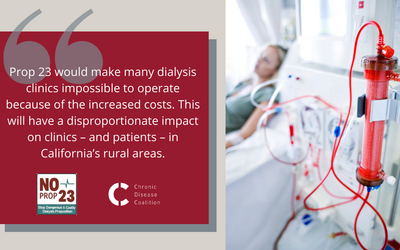
Voters in California will be asked to consider a complex question of health care policy next week at the ballot box. Proposition 23, if passed, would require that each of the state’s 600-or-so kidney dialysis clinics have a doctor or nurse-practitioner on site during normal operating hours. Proponents say that this step is critical to ensure patient safety. The truth is that this ballot measure has little to nothing to do with patient safety, and everything to do with employee union desires to unionize the state’s dialysis clinics.
The Chronic Disease Coalition is not in the business of weighing-in on the pros or cons of unionization, that’s not what we do. But we are in the business of protecting patient rights and fighting for patient access. And make no mistake, Prop 23 is a direct assault on patient access.
Prop 23, despite what proponents claim, would have no discernible impact on patient well-being. Today, California’s kidney failure patients are prescribed dialysis treatments by their nephrologist physicians, then undergo that prescribed treatment several times a week. Except for rare cases where treatment is done is a hospital setting, the vast majority of dialysis treatments are conducted at dialysis clinics by well-trained professional dialysis clinicians. Results for this vulnerable patient group are outstanding and positive. Problems, which of course happen in every clinical setting, are relatively rare in dialysis clinics given the experience and high levels of training required at California’s clinics. The bottom-line is that Prop 23 is a solution looking for a problem.
But it doesn’t end there. Prop 23 would in fact create a problem that doesn’t currently exist. Prop 23, by requiring that additional and high-paid professional medical staff be on-site even when not needed, will drive up the cost of dialysis care and overall healthcare. Insurance companies, including the public option, will be required to raise rates on everyone in order to cover the increased costs of dialysis care. In addition, California already has a shortage of doctors. Prop 23 will exacerbate this shortage by driving up both costs and wait times for all medical services.
Worse, Prop 23 would make many dialysis clinics impossible to operate because of the increased costs. This will have a disproportionate impact on clinics – and patients – in California’s rural areas. Many of these rural clinics already operate on the thinnest of margins due to the relative geographic sparsity of patients. If these clinics are forced to close because of the new costs imposed by Prop 23, rural patients may be required to travel hundreds of miles to receive the dialysis treatment they need in order to live. This is, needless to say, colossally unfair and unjust.
California voters should say “NO” to Prop 23.